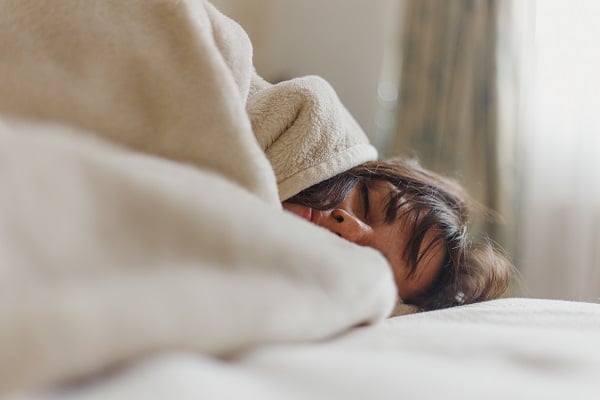How much sleep do you need? Needing to know how much sleep you need is a question that’s been around for years. Some people say that you only need a few hours of sleep each night, while others believe you need eight or more hours to be productive.
So, who is right? The answer may surprise you! This blog post will dive into sleep science and how much each person needs to be productive and healthy. It will also dispel some of the myths about sleep that have circulated for years. Are you ready to learn more?
Contents
- What Is The Meaning Of Sleep?
- Sleep Needs
- What’s The Right Amount Of Sleep For You?
- Signs That You’re Not Getting Enough Sleep
- Problems With Your Skin
- Issues With Your Digestive System
- Dealing With Heart Problems
- Is It Possible To Get Too Much Sleep?
- What Causes Oversleeping?
- What Are The Risks Of Oversleeping?
- Diabetes And Heart Disease
- Obesity Risks
- Depression
- How Much Sleep Do You Need?
- Related
What Is The Meaning Of Sleep?

Sleep is something that everyone needs, but its true purpose has been something of a mystery. While most people know that good sleep is essential for good health, why do you need sleep? And what happens when you don’t get enough sleep? Sleep experts have only recently begun to unravel the many mysteries of sleep.
They now know that sleep is vital for good physical health. Poor sleep can lead to many health problems, including obesity, heart disease, and diabetes. It can also affect your mental health, causing anxiety and depression. To function at your best, you need to get enough good-quality sleep.
So what exactly is good-quality sleep? It turns out that there are different stages of sleep, and you need to go through all of them to get a good night’s rest.
During the first stage of sleep, you drift off into light sleep. The next stage is a deeper stage of sleep known as slow-wave sleep. Finally, you enter REM sleep, which is when you dream. Your body needs to go through these stages to rest and recharge fully.
Sleep Needs

Sleep is an essential part of your health and well-being, providing you with the physical and mental energy you need to function throughout the day. Many factors influence sleep quality, including the amount of sleep, sleep schedule, nighttime sleep habits, and sleep environment.
Sleep needs can vary significantly from person to person. Some people may function best on very little sleep, while others require a large amount of sleep each night to feel fully rested and energized. Some research suggests that this variation may be due to differences in sleep quality, meaning that some people may experience deeper or more restful sleep than others.
Some people may experience a deeper or more restful sleep, which can be from a person’s sleep schedule, which refers to the ideal time to go to bed and wake up each day. Sleep schedules can include maintaining consistency between weekday and weekend sleep schedules, going to bed at a regular time each evening, or having daytime naps during the week.
Along with sleep quantity and schedule, nighttime habits also influence sleep quality. Nighttime habits can include having a comfortable sleeping environment (such as the correct type of mattress or pillow), limiting distractions before bed (such as eliminating electronics or putting away clutter), and adhering to bedtime routines.
What’s The Right Amount Of Sleep For You?

There is no definitive answer to how much sleep is right for you. Different people have different sleep needs, depending on various factors such as mental and physical health, lifestyle habits, age group, and sleep quality. Generally speaking, though, experts recommend getting somewhere between 7-9 hours of sleep each night to promote healthy brain functioning and physical well-being.
While it can be tempting to skimp on sleep when busy or have a lot going on, research suggests that poor sleep can negatively affect our health. So what exactly constitutes “the right amount” of sleep? Only you can answer that question by paying attention to your body’s signals regarding how much sleep it needs each night.
Generally speaking, though, anything between 7-9 hours per night should help keep you feeling your best. However, it’s important to remember that too little sleep and too many hours of sleep can also be an issue.
Signs That You’re Not Getting Enough Sleep

As mentioned before, most people need at minimum seven hours of sleep each night to function at their best. However, many people struggle to get enough rest regularly. If you feel tired during the day or have difficulty concentrating or remembering things, it may be a sign that you are not getting enough sleep. However, there may be other signs you experience caused by sleep deprivation.
Problems With Your Skin
If you are experiencing problems with your skin, such as breakouts, redness, or irritation, it may be a sign that you are not getting enough sleep. Skin problems can be because lack of sleep can significantly impact your lifestyle and health, including your skin.
Studies have shown that chronically sleep-deprived people tend to exhibit poorer lifestyle habits overall. For example, they may eat more junk food and less nutritious foods, leading to deficiencies in essential vitamins and nutrients that can damage the skin from the inside out. Additionally, they may also be more likely to skip exercise or engage in other behaviors that typically promote optimal skin health.
Issues With Your Digestive System
Your digestive system is a complex and sensitive system that can get off balance. Lifestyle factors, such as stress, poor diet, and lack of exercise, can contribute to digestive issues. However, one often-overlooked factor is sleep.
Sleep plays an essential role in regulating the body’s circadian rhythms. When you don’t get enough sleep, your body’s natural rhythms are disrupted, leading to various issues, including digestive problems. Studies have shown that sleep-deprived people are more likely to experience digestive issues.
Dealing With Heart Problems
Dealing with heart problems is often a sign that you are not getting enough sleep. The circadian rhythm, or your body’s internal clock, is strongly influenced by sleep patterns. When you don’t get enough restful sleep each night, you experience something known as sleep debt, which can disrupt your circadian rhythm and cause many negative health consequences.
One of the most severe effects of chronic sleep deprivation is an increased risk of developing chronic diseases, such as heart problems. When you are tired, your body produces higher levels of stress hormones like cortisol.
Cortisol can lead to inflammation and other issues that contribute to cardiovascular conditions. Additionally, insufficient sleep limits the body’s ability to regulate glucose levels and manage other critical physiological processes to maintain a healthy heart.
Is It Possible To Get Too Much Sleep?

It is no secret that getting a good night’s sleep is vital for overall health, but many don’t realize that sleeping too much is possible. Oversleeping can have just as many negative consequences as undersleeping.
One of the biggest problems with oversleeping is disrupting the body’s natural sleep-wake cycle. Disrupting the body’s natural sleep-wake cycle can lead to a condition known as rem sleep deprivation, which can cause fatigue, irritability, and difficulty concentrating. Oversleeping can also worsen underlying health conditions, such as depression and anxiety.
Of course, everyone’s sleep needs are different, and there is no magic number of hours that everyone should have. However, most experts agree that 7-8 hours per night is optimal for most people. So if you find yourself sleeping more than regularly, it might be time to make some changes.
Cutting back on caffeine and alcohol before bed, establishing a regular sleep schedule, and creating a relaxing bedtime routine can all help to promote better sleep. And if you’re still struggling with getting too much sleep, it’s essential to talk to a doctor to rule out any underlying medical conditions.
What Causes Oversleeping?

Most people need around eight hours of sleep per night. However, some people may need more or less sleep depending on their age group. For example, people in younger age groups need more sleep than adults. Elderly adults, on the other hand, often sleep for shorter periods.
Oversleeping is relatively common and can be from several factors, including sleep deprivation, medications, sleep disorders, and depression. In most cases, oversleeping is nothing to worry about and will resolve itself over time. However, if oversleeping interferes with your daily life, it may be worth seeing a doctor rule out any underlying health conditions.
What Are The Risks Of Oversleeping?

The risks of oversleeping are many and varied, and they can affect a person in both the short- and long-term. In the short term, an individual may experience daytime fatigue or drowsiness, interfering with alertness and productivity. For example, someone who oversleeps in the morning may struggle to focus on their work, resulting in lower quality performance. Over time, oversleeping can also lead to serious health problems.
Diabetes And Heart Disease
According to medical experts, spending too much time in deep sleep can be an underlying cause of diabetes and heart disease. When we oversleep, our bodies have a more challenging time regulating blood sugar levels, leading to diabetes.
In addition, oversleeping raises levels of certain hormones that cause high blood pressure, putting strain on the heart and raising the risk of heart disease. So if you find yourself struggling to get out of bed in the morning, it’s essential to consult with a doctor to rule out any underlying medical conditions.
Obesity Risks
There’s been a link between obesity and oversleeping, but researchers are trying to determine how they are connected. One theory is that underlying causes of obesity, such as hormonal imbalances or genetic factors, may also lead to oversleeping. Another possibility is that people who are obese tend to experience more deep sleep, which is associated with increased appetite and cravings for high-calorie foods.
Depression
Depression is a neurological disorder that can cause various symptoms, including oversleeping. While it is common for people with depression to experience fatigue and sleepiness, oversleeping is more than just feeling tired. It is a symptom of depression that can lead to other problems.
While the exact cause of this link is not clear, there is suspicion that the changes in the brain that occur with depression may play a role. It is essential to be aware of the potential risks associated with oversleeping.
How Much Sleep Do You Need?
So, how much sleep do you really need? It depends on various factors, including your age, lifestyle, and underlying health conditions. However, most experts agree that adults should aim for at least seven hours of sleep each night. And while it’s essential to get enough rest, oversleeping can have serious consequences.
If you struggle with sleeping problems, consult with a doctor to rule out any underlying issues. And remember, getting a good night’s sleep is vital for your health, but oversleeping can have serious consequences.


